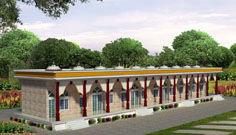Paryushan Parva
Paryushan Parva is the king of all festivals and hence is known as Parvadhiraj. Parvadhiraj Paryushana, this festival has the highest power of doing auspicious to the worshippers. This festival takes the soul to the upper condition. It lights the lamps of life i.e. pious life. This festival also shows the path of salvation. It is compared with water works through which one can clean one's soul from the dirt of Karmas. This also makes the sinful persons pious and virtues. The souls which are already aware about the merits and sins, can do their duties, but those people who are still passionate towards worldly pleasures become aware of new motivation. So this festival is celebrated.
Paryushan means, literally, "abiding" or "coming together". It is also a time when the laity take on vows of study and fasting with a spiritual intensity similar to temporary monasticism. Paryushan concludes with a time of confession and forgiveness for the transgressions of the previous year.
This festival lasts for eight days. Jain festivals are not meant for eating, drinking and to make merry. Jain festivals are celebrated by penance, Jap (recitation of Mantra) prayer, worship and friendship. The most important part of Paryushan is daily meditation and prayer, which provides an opportunity for looking within and towards the teachings of the Tirthankaras for guidance. Beginning on the fourth day of Paryushan , it is customary for all of us to read from the Kalpa Sutra , a scripture which recounts the life of Mahaveera the 14 dreams of his mother before his birth, followed by the story of his birth, life and liberation. It also recounts the lives of other Tirthankaras and the rules of Paryushan.
The final day of Paryushan is Samvastsari Pratikraman , the annual confession. The ritual of asking forgiveness from the teacher is widened in scope to include family and friends and, finally, all living beings. The culmination of confession is receiving forgiveness from all living beings and also granting forgiveness to all. This ritual of forgiveness is sometimes called the rite of "universal friendship". The spirit of the day is contained in this verse: "I grant forgiveness to all living beings, May all living beings grant me forgiveness; My friendship is with all living beings, My enmity is totally non-existent. Let there be peace, harmony and prosperity for all".
The word "Paryushan" has several different meanings:
- Pari + ushan = all kinds + to burn = to burn (shed) our all types of karmas. To shed our karmas, we do twelve different types of austerities including fasting.
- Another meaning of "ushan" is to stay closer. To stay closer to our own soul from all directions and to stay absorbed in our own-self (soul), we do Svadhyaya5 (self-study), meditation, austerities, etc.
- Pari + upshamana = upshamana means to suppress, to suppress our passions (kashayas - anger, ego, deceit and greed) from all directions.
Therefore, the real purpose of the Paryushan is to purify our soul by staying closer to our own soul, to look at our own faults, to ask for forgiveness for the mistakes we have committed, and take vows to minimize our faults. We try to forget about the needs of our body (like food) and our business so that we can concentrate on our-self.
To ask for forgiveness is the toughest thing to do. Therefore, our great Acharyas6 have said:
"Kshama Viram Bhushanam, Kshamavani Michchha Mi Dukkadam"
- To ask for forgiveness is a great quality of the brave ones and if I have committed any mistake, knowingly or unknowingly, I ask for your forgiveness.
There are several great aphorisms (Sutras) to ask for forgiveness with the unity of the body, speech and mind, and one of them is as follows:
Khamemi Savve Jiva, Savve Jiva Khamantu Mi
Mitti Me Savva bhuesu, Veram majjham na Kenai.
Meaning: I forgive all the living beings of the universe, and may all the living-beings forgive me for my faults. I do not have any animosity towards anybody, and I have friendship for all living beings.
The process of shedding our karmas really begins by asking for forgiveness with true feelings, and to take some vows not to repeat mistakes. The quality of the forgiveness requires humility (vinay - absence of ego) and suppression of anger.























